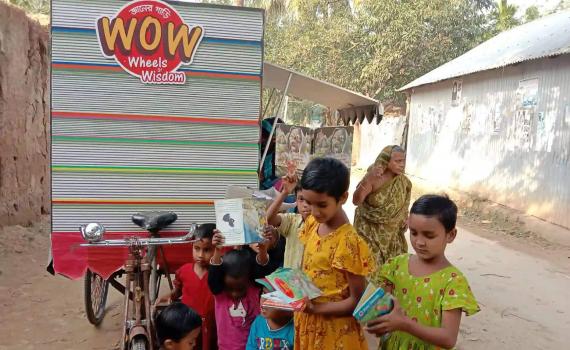
When COVID-19 forced schools in Bangladesh to close in March 2020, Jannat, aged 11, had to go to work in a garment factory to help supplement the family income. She feared her education had ended forever. Hope came in the form of a tiny three-wheeled mobile library loaded with books and offering a free internet connection. Jannat began borrowing books, has restarted her learning, and now she is determined to go back to school one day.
The mobile library is one of three serving poor communities in Dhaka as part of the Wheels of Wisdom (WoW) project. WoW is implemented by the non-profit organization, the Grow Your Reader Foundation, which promotes children’s education and development by starting libraries, providing a literacy teaching curriculum and resources for teachers and parents, and managing an educational channel on YouTube.
“Our main objective with WoW is to protect the learning rights of underprivileged children and build their interest to go back to school post-pandemic,” said Sadia Jafrin, Founder and Chief Executive Officer of the Grow Your Reader Foundation.
“People from low income communities may have smartphones but they can’t afford the cost of regular or lengthy internet use. They do not need revolutionary technology to continue their learning. They just need a simple and accessible tool - and that is what we are providing with WoW: a library with a skilled librarian, books and e-books, and an internet hotspot for children to go online and study,” said Sadia.
THE PERFECT VEHICLE
The WoW three-wheelers are the perfect vehicle to take learning to the places where the children live or work. “Poor parts of Dhaka are low lying. The roads are narrow and muddy and in the rainy season they are flooded. Our WoW vans are small, light and electrical. They work well in these areas,” explained Sadia.
“Our librarians buy internet packages and keep the hotspot on. Children connect their devices and join in our online classes and watch our educational videos from our YouTube channel. Each child can use the hotspot for one hour per day. Our librarians monitor their internet use to make sure that they are using it for their education.
“Alongside the vans there’s a poster for building COVID-19 awareness on how to protect themselves from corona which will help them build a daily hygiene habit,” he said.
In just 13 months, the three mobile libraries distributed over 5,600 books to 4,300 children. About 2,700 children used more than 21,000 hours of internet from the hotspots.
“During the pandemic, my husband and I lost our jobs and thus couldn’t send Moumita to school anymore. But Moumita frequently runs towards the library van and borrows books to read every week. This has kept the light of learning ignited within her still now.” - Mother, Dhaka
TOOLS FOR SELF-LEARNING
Schools reopened in September 2021, after 18 months, and the Grow Your Reader Foundation considered stopping the WoW project. However, there was still a need for the project because many children were not able to return to school.
Recently, the project received funding through Global Youth Mobilization, which is supported by the World Health Organization and the United Nations Foundation. “Now we are planning to enhance our capacity by three times to make a greater impact on our community. Already we have extended the operation in another division of Bangladesh, Mymensingh,” said Sadia.
“Still today many children go to their workplace and directly afterwards, come to our vans to read books. They need tools for self-learning and we are trying to provide them with that so that when they have the opportunity, they can return to their schools,” said Sadia.
PLIP-EDUCATION





